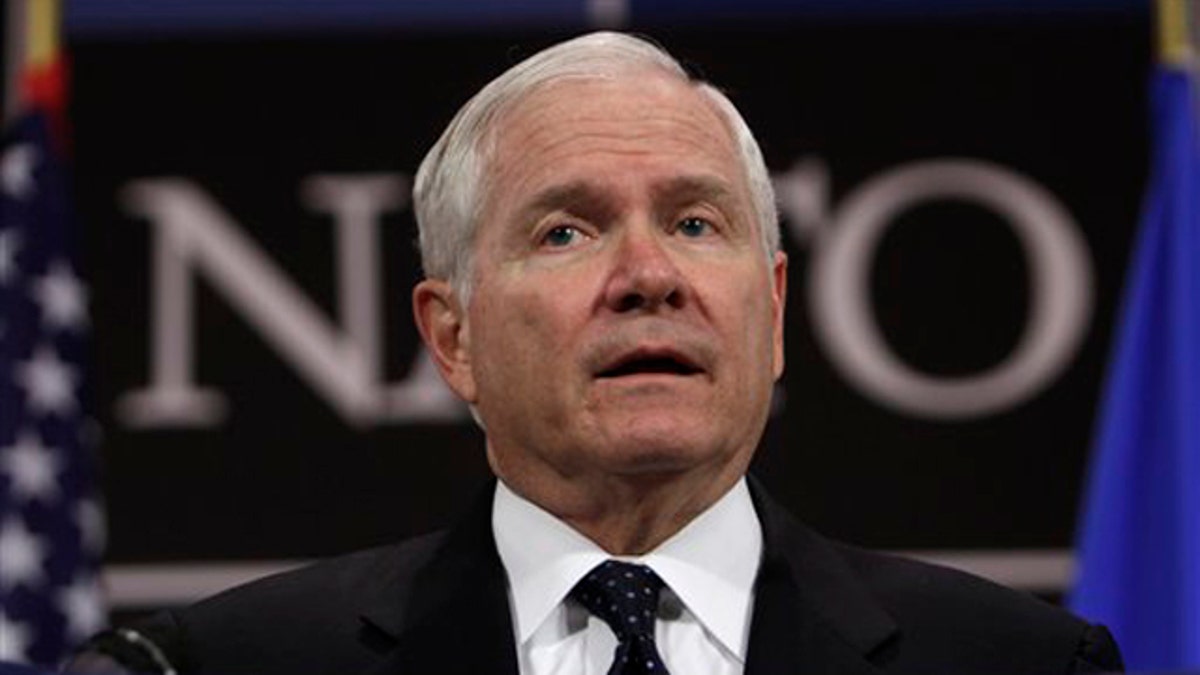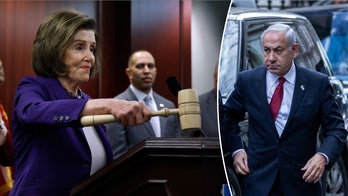
Defense Secretary Robert Gates speaks during a media conference after a meeting of NATO defense ministers at NATO headquarters in Brussels June 9. (AP)
The Obama administration is struggling to keep Congress on board as it appeals for patience in Libya, with lawmakers in both chambers moving to check the president's war powers as the cost of the operation rises.
The Senate fired a warning shot on Wednesday with a bipartisan-backed resolution chiding President Obama for failing to provide a "compelling rationale" for the mission. The measure is similar to one that passed the House last week -- however, this one is tougher in that it calls for the president to seek permission from Congress to remain in Libya.
The challenge of selling Libya got even harder Thursday as a Financial Times report claimed the Pentagon is pegging the monthly cost of the operation at about $60 million, as opposed to the $40 million a month officials had estimated earlier. A Pentagon official told Fox News that $40 million a month is still the working projection but said the number could rise.
Defense Secretary Robert Gates said last month the operation could cost $750 million through the end of September -- it's now clear that unless the mission ends soon, it will cost at least $90 million more than that even if the cost remains at $40 million each month.
In the face of mounting discontent, administration officials are pledging to work with Congress while insisting U.S. forces stay until the job is done -- without defining exactly what the endpoint would look like.
"We have seen the regime weaken significantly. We have seen the opposition make gains both in the East and the West," CIA Director Leon Panetta, Obama's pick to replace Gates, told a Senate panel Thursday. "I think there are some signs that if we continue the pressure, if we stick with it, that ultimately (Muammar) Qaddafi will step down."
Gates told NATO on Thursday that "we're in this thing with our allies to the finish."
White House Press Secretary Jay Carney also said the president will "endeavor to answer" all the questions about the mission the House posed to the White House with its resolution last week.
But while claiming consultations with Congress have been "extensive and constant," he also described the Senate's latest resolution as unhelpful.
The Senate resolution, like the House resolution, makes a blunt threat in stating Congress has the "constitutional prerogative to withhold funding for any unauthorized use of the United States Armed Forces." It also calls on the White House to provide information on 21 separate issues within 14 days of enactment.
It's unclear whether and under what conditions Congress would start to use funding as leverage.
Christopher Preble, foreign policy analyst with the Cato Institute, noted that it would be "rare" for Congress to follow through on a threat to cut off funding for military operations -- and he said the Pentagon budget is so large the military could potentially shuffle money around to keep the mission going.
He described the congressional debate as a "principled argument," but one worth having.
A key concern of lawmakers is that the president has flouted the War Powers Resolution, which requires the president to seek congressional authorization for military intervention within 60 days.
More than 80 days into the mission, resolution co-sponsor Sen. Jim Webb, D-Va., said the president has "clearly" violated that provision. He expressed concern that the White House is setting a risky precedent.
"We're faced, in my view, with the prospect of a very troubling, if not downright odd, historical precedent that has the potential to haunt us for decades," Webb said on the floor of the Senate.
"The issue for us to consider is whether a president, any president, can unilaterally begin and continue a military campaign for reasons that he alone has defined as meeting the demanding standards of a vital national interest worthy of risking American lives and expending billions of dollars of our taxpayers' money."
As Webb and his colleagues push their resolution, the Senate apparently has put on hold a separate resolution meant to express support for the mission. Sen. John Kerry, D-Mass., chairman of the Senate Foreign Relations Committee, had intended to work on the measure Thursday, but with discontent bubbling to the surface he has postponed the action likely to next week, according to a panel member.
Some lawmakers are urging the United States to step up its military effort with the express goal of forcing Qaddafi from power. And they caution against the move to rein in the president.
"In Libya, there are signs that Qaddafi may be starting to crack. But the odds of a stalemate remain far too high. I believe U.S. strategy should be to reduce those odds as much as possible and quickly force Qaddafi to leave power rather than hoping we achieve that objective with minimal effort," Sen. John McCain, R-Ariz., said Thursday at the Panetta hearing.
Sen. Lindsey Graham, R-S.C., at the same committee hearing asked Panetta about the consequences of Qaddafi remaining in power.
Panetta said that outcome would send a "terrible signal" and indicate that the United States' "word isn't worth very much."
Graham agreed with Panetta, and said he couldn't wait to vote for him.




